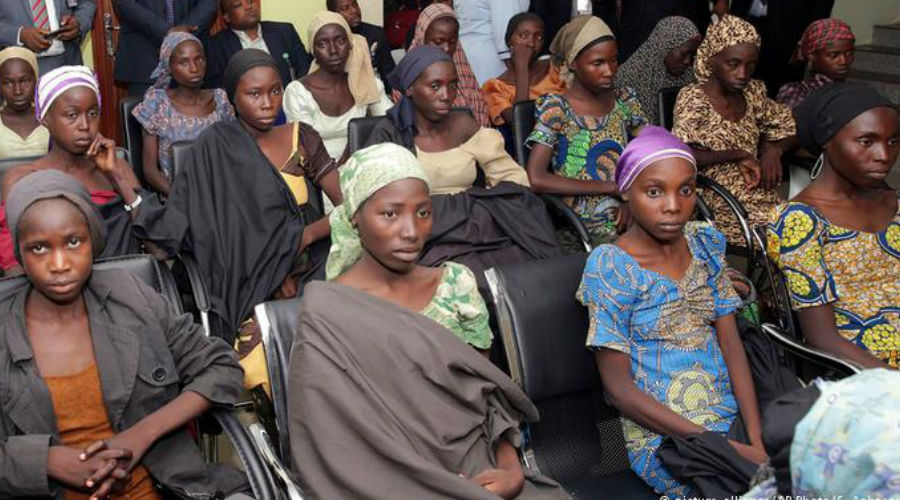Notably, these variables appear to be encouraging some women to take this very path. A good instance is Nigeria where Boko Haram, known as Islamic State West Africa Province or ISWAP, kidnapped 276 female students from a government secondary boarding school in the town of Chibok in Borno State. Following negotiations with the Nigerian government, Boko Haram agreed to release 82 girls in return for handing over five Boko Haram elements. But surprisingly, some of these freed girls insisted on staying within Boko Haram’s strongholds instead of going home. Although only a few girls preferred to stay with, or return to Boko Haram, their decision raised questions, especially after some international organizations reported massive violations by the group after the abduction of the girls in 2014.
Significant Interest
Boko Haram developed a remarkable interest in increasing the number of their women through recruitment using various methods, abducting or buying them from human trafficking gangs with money.
The phenomenon can be explained by an approach the group has pursued in recent years to rely on women recruits to carry out some terrorist attacks and suicide bombings in particular. Compared to male elements, female suicide bombers are less vulnerable to inspection by security authorities, an advantage turning women members into transporters of arms and explosives that the group seeks to hide.
The most high-profile terrorist attacks carried out by female elements in Nigeria include a suicide bombing at a bus station in the north-east, that killed seven people and injured dozens in May 2015, and another that hit a mosque in Maiduguri City that killed eight and injured 15 others.
Of the 434 suicide bombers Boko Haram has deployed between April 2011 to June 2017, 244 - or 56 percent - were identified as female, according to a comprehensive study of the phenomenon by experts at the Combating Terrorism Center (CTC) at the U.S. military academy West Point. The scale of the group’s use of women as suicide bombers sets Boko Haram apart from other terrorist groups, according to the study released in August 2017.
Various Reasons
The decision of some schoolgirls to stay with Boko Haram after it freed them can be explained as follows:
1- Mechanisms of Integration. According to several views, the group used a group of mechanisms to recruit women. These include financial and social support that takes advantage of high poverty rates and low education levels in some areas. Moreover, the group was particularly interested in tasking women, including the Chibok schoolgirls, with proselytization and other organizational missions after training and indoctrinating them with extremist ideologies. The group also sought to create a social bond with some of the girls, including, reportedly, through marrying them off to its fighters. However, according to other views, this claim is not consistent with the facts on the ground that the group committed systematic physical and psychological violations against the girls. Other international reports claim that such violations include forced marriage to fighters, forced conversion and even giving them new names to the girls.
2-
Post-return Implications. Boko Haram’s treatment of returning schoolgirls
represents another reason driving them to insist on staying in the group’s
strongholds. In particular, the marriage of some of these girls to fighters has
marred their relations with the surrounding society which treated them as
suspicious. This indicates the importance of society in preventing individuals
from embracing ideologies of terrorist organizations and joining in.
3- Economic Hardships. Some of the girls suffered from difficult economic conditions before their abduction and after they returned to their home areas, due to an increasing poverty rate, a decline in basic services such as healthcare education and others. It should be noted that the economic variable has always helped terrorist organizations in recruiting more extremist elements, and especially when they seek to ensure sources of funds, in addition to donations, taxes and ransoms for kidnappings. For instance, Boko Haram raked in US$3,15 million in ransom money for the release of a French family it had kidnapped in February 2013.
4- A lack of rehabilitation programs that can help girls in giving up extremist ideology that the group tried to instil on their minds while in captivity. This reduces the possibility of their return to its strongholds, their willingness to carry out terrorist attacks or attempts to spread this ideology among people in their society.
That said, it can possibly be concluded that although only a small number of girls returned to, or stayed with group after it released them, the development does indicate Boko Haram’s dangerous ability to recruit women to serve its extremist agenda, and is even more significant given that the group increasingly uses them to carry out suicide attacks. This prompted calls for giving attention to poor areas and improve various services, including medical, psychological and social assistance, while launching a non-traditional campaign to re-integrate the freed girls into society to reduce the group’s ability to recruit more elements in the future.


